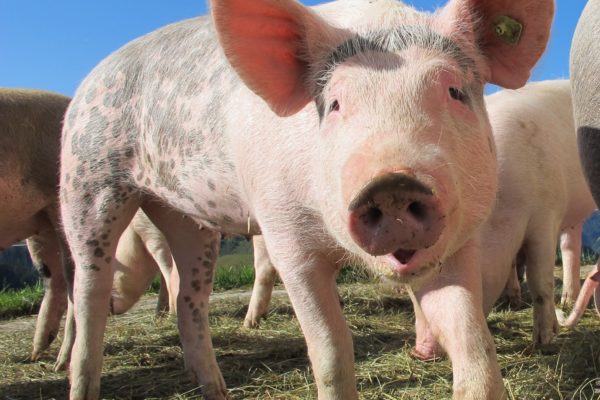Have you ever seen the parts, pieces and processes involved in making a tasty pork sausage? If not, you might want to get hold of your gag reflexes, take deep breaths, and clear your mind of anything vulnerable that you don’t want stained. When you’re ready, read on as I describe for you how my very first job making sausage closely resembles how I go about completing writing tasks today.
My first job was actually intended as punishment. I was 10 years old and freshly suspended from elementary school. My school’s principle was not positively impressed when I fed my fellow monkey-bar mates a whole box of chocolate Ex-Lax squares during recess. My father, unable to discipline me with a straight face, instead conscripted me to Mr. Orin’s slaughterhouse for the duration of my one week suspension.
Punishment commenced abruptly when my dad unceremoniously yanked my Dukes of Hazzard blanket off and forcible extracted me from my bed at 4am. He denied me Boo Berry breakfast, then blocked constitutional hugs and kisses, even sight of my mother. With crust still in the corners of my puffy eyes, he ejected me into arctic Maine morning to scrape the windows of his old truck with a spatula.
We drove a painfully slow dawdle through town each morning that cold, cold week. Dad made unnecessary, premeditated stops for gas and coffee, even thought his tank and thermos were both nearly full. At each stop he shut the truck off and took the keys so I couldn’t listen to the radio or lounge in the heat. He clearly didn’t want me to enjoy any distractions, or to avoid any of the many discomforts. I was sternly told – with the aid of an angry forefinger – to stay put. Stay put I did, perched in the frigid cab, shivering in silence. I felt like a zoo monkey, on exhibit while my dad pointed and told everyone he knew exactly what he was doing to me. by the time we arrived at the slaughterhouse every morning, my lips were blue and my otherwise good name had become a synonym for shame. I ached from outside in. Meeting Mr. Orin was both comforting and confusing at the same time. he asked me my name, then refused to use it. He shook my hand, then told me I had soft hands like his wife. Then he thrust a greasy brown paper lunch sack at me and asked: “You hungry?” I was hungry. I told him I was hungry. “You like sausage?” he asked. I did like sausage. I told him I liked sausage. He and my dad exchanged devious, conspiratorial glances while I fed my face odd-shaped scraps of fried sausage from the greasy bag. Then, as fast as the duplicitous scene played out, my dad was in his truck and gone. He didn’t eat any sausage, either.
Mr. Orin, a rather gelatinous fellow the size of a refrigerator with a straw hat on top, could have been plucked to life from a Norman Rockwell painting. He deceptively advertised his countenance as if it were a welcome mat. He wore his denim overalls and green rubber boots confidently, as if they successfully concealed his black reaper robes underneath. His mortal imagery did obscure his otherworldly barbarism. I was certainly fooled at first. However, Mr. Orin quickly revealed himself to me.
“Follow me, Saul,” he chuckled. I considered correcting his intentional error of my name until I saw the pigs, dozens upon dozens of perfectly pink pigs. They were snuffing and chuffing and oinking in a fenced-in utopia of their own sour stink. Mr. Orin snatched the greasy bag from my hand and said: “One thing about pigs and people, little Snoopy, is that they’ll eat anything, even each other!” He then hand-fed the rest of the fried pork flesh to the ravenous snots, crumpled up the empty bag and tossed it into the frenzied blur of pig masses. The indiscriminate cannibals ate that, too.
At this critical juncture in my protracted, mangled metaphor about how I write, I can see no reason to tell you much about how Mr. Orin told me to pick a pig, or about how or why I picked a particularly plump one that he immediately named Percy. Nor am I compelled to dispense much detail about how Mr. Orin cleverly coaxed Percy the pig into a slipknot leash that was crispy with dried blood, then led him to an even bloodier killing bay made of concrete while lovingly telling Percy how lucky he was to be such an integral part of the sausage-making industry. My original intent and goals for writing about my own writing in the first place, seem even more distracted by telling you that Mr. Orin produced a small pistol from his front pocket and began the sausage-making process with a pop. And if you tell anyone that I told you I bleated like a baby goat right then, cried and peed my pants, I will deny it.
Now, for those of you who have been lucky enough to avoid the sights and smells of a backwoods slaughterhouse – especially one that has never suffered a visit from the Maine Health Department – I must apologize in advance because my
Written words will fail to adequately describe those sickening sights and assaultive smells for you. I mean, I can write about Mr. Orin’s putrid gut buckets, describing how whitish guts, tendons, membranes, brains, eyeballs, fat and other connective tissues get piled into one bucket while reddish guts, the tongue, digestive juices and blood slurry goes in another bucket. I could write about how a bucket of warm guts still moves, trembles, bubbles, even burps a miasma of gasses. But, can you smell it? that nasal element might be missing. It might be missing in much the same way a visual element might be missing if I tried to describe a color for you that I conceived in my mind. As an aspiring writer, however, I have to at least try, don’t I? I have to start somewhere, building on a glimpse, sound or sniff that I suspect you are familiar with, don’t I?
When I write these days I make a concerted effort to find and write glimpses, sounds and sniffs that I suspect my readers will be familiar with. my writing process also has gut buckets; those gut buckets are commonly referred to as thought bubbles in the writing community. Mine are never pretty. Some overflow. Some are empty. Some stink and contain unmentionables. The guts of my writing process are often strewn across my desk, written on my hands, even spilled haphazardly across the floor.
It all starts when I exercise the courage just to pull that trigger. I then fill the gut buckets. I pick out the potentially tasty constituent parts and discard the rest. I then revise my revisions, again and again, adding fleshy red here and particulate whites there until I’m satisfied that it looks and tastes (I mean, says and represents) exactly how I want it to.
Whenever I harvest anything from my soul and commit it to ink, I try especially hard to engage all of my senses, even if I know that I lack the literary skills to transfer them to paper perfectly. I know I have to work at it. so far, these efforts have paid off more often than not. For me, the labor pains of writing anything worth reading are well worth the suffering; indeed, unlike the terminal pride of a tasty sausage-maker, the proud parent of polished prose can marinate in the flavor of his or her own creation – exactly as they created it – forever. Sausage deteriorates, stinks, then goes bad.




